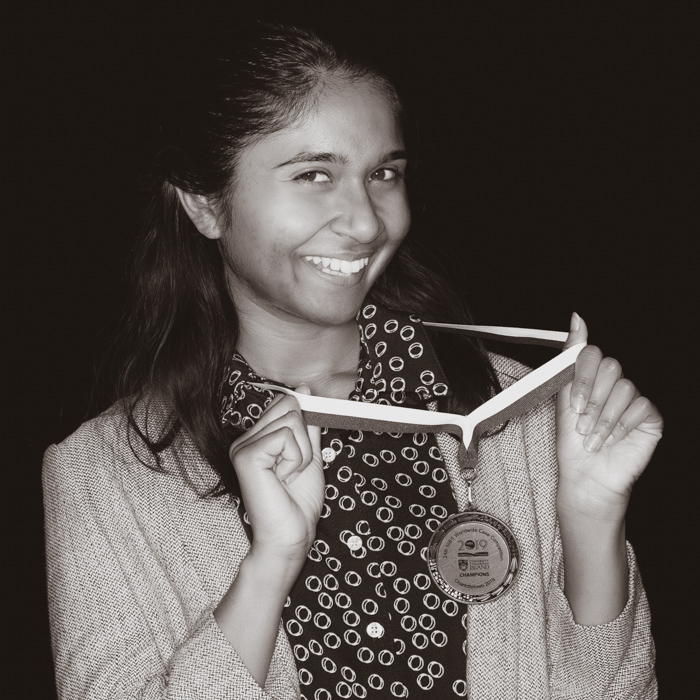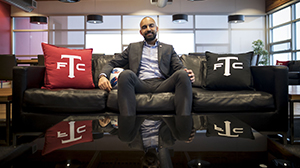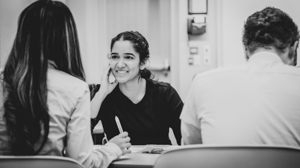- Future Students
- Current Students
- Faculty
- Staff
- Alumni
- Others
UofGH wins prestigious NIBS International Case Competition
 Priya Rajkumar
Priya Rajkumar
The University of Guelph-Humber has won the Network of International Business Schools (NIBS) International Case Competition, besting 15 other universities from all around the world.
The team representing UofGH – Daniel Bielak, Jhanvi Jamindar, Shirin Monga and Priya Rajkumar – triumphed during the recent championship week in Charlottetown, P.E.I., over universities from as far as Belgium, the Netherlands, Guatemala, Denmark, Germany, Ireland, the U.K., and the United States.
It was the second year in a row UofGH competed at NIBS, which is considered the world’s leading international business case competition with more than 20 years of history.
“I am very happy all the hard work and months of preparation paid off. This is one of the hardest undergraduate case competitions in the world,” said Assistant Program Head of Business Justin Medak, who devotes his time every year to coaching, training and preparing UofGH students for case-competition success.
“The team chemistry between Daniel, Jhanvi, Shirin and Priya was evident early on in our practice sessions. They grew a friendship and respected each other but also knew when to challenge each other.
 Daniel Bielak
Daniel Bielak
“The victory matches our 2011-2012 Royal Roads University International Undergraduate Case Competition first-place vistory as our top international case competition accomplishment within the Business program.”
A high-pressure final
During the seven days UofGH’s team was in P.E.I., the work didn’t let up. During the tiring early days of the competition, their days started as early as 5:30 a.m. and often didn’t end until late into the night. In the first three rounds, teams in four divisions compete in three round-robin matches before the top two teams advance to a quarter-final stage of four knockout matches. The final day is actually the most demanding of all, with a four-hour semifinal lockdown in the morning followed by a three-hour session during the final in the afternoon.
In the final round, UofGH competed against Rotterdam University of Applied Sciences from Netherlands. The teams were tasked with presenting a strategy to KidZania, a Mexican company that developed and operated theme parks where children could play as grown-ups and pretend to be adults.
The company needed to decide how to differentiate their brand and grow revenues in a very competitive edu-entertainment market. The finalist teams were presented with four possible growth strategies, which included opening additional theme parks, developing a new type of indoor park, expanding through a digital platform, or creating media content based on KidZania characters.
“The most challenging aspect of NIBS is overcoming exhaustion as there is little to no downtime due to a tight schedule,” Monga reflected. “NIBS Worldwide Case Competition is unique—there is no other competition like this! Hence, it requires extensive preparation to understand what the judges look for in a team’s performance.
 Jhanvi Jamindar
Jhanvi Jamindar
“The training sessions build critical skills such as leadership, communication, diligence, patience, stress management, and thinking and working fast to make optimal business decisions with limited time and knowledge. These transferable skills can easily be applied to the business world as challenges occur every day.”
Certainly, the team’s rigorous preparation was a big part of their success, along with the diligent work of Medak, who assisted with every practice session. That collaborative and thorough approach to case competition preparation has served UofGH well – in fact, the University of Guelph-Humber placed in a record 54 case competitions in 2017-18 and recently finished in second place at Dalhousie University’s Ethics in Action Case Competition.
“The most challenging aspect of NIBS is all the work leading up to it,” Bielak said. “We had nine practice sessions before the competition. We had spent hundreds of hours on research after our reflections on those practices, on top of building a deck and dealing with hard days when we mess up our strategy.”
Future application
Beyond the thrill of winning, the students took much away from the NIBS experience. They appreciated the opportunity to polish their presentation skills, to test their critical-thinking faculties in a high-pressure situation, and to network with business professionals and students from around the world.
 Shirin Monga
Shirin Monga
“After competing in an international competition, it not only allowed me to create international connections with people, but it also helped me improve my presentation skills,” Rajkumar said. “Now, I am able to confidently convey my ideas to a group of people which will help me throughout my future career goals.”
The specific demands of the cases the students faced also provided valuable learning opportunities.
“The NIBS journey has taught me so many skills that will help me in the future,” Jamindar said. “Before NIBS I could not even imagine creating a good presentation in a couple of days let alone a couple of hours. Before NIBS I had no idea how to do a Discounted Cash Flow statement, let alone what a Sensitivity Analysis and a Value Chain Analysis was.
“This journey has also given me the opportunity to create so many amazing bonds with amazing individuals around the world,” she added. “From my friends in Puerto Rico, to Guatemala, to London, Dublin and the Netherlands and of course individuals from all across Canada and the United States. These relationships and teachings will be something I am grateful for throughout my entire lifetime and I cannot thank NIBS enough for everything it's given me.
“While winning was absolutely amazing, the journey is something that I will always cherish.”







